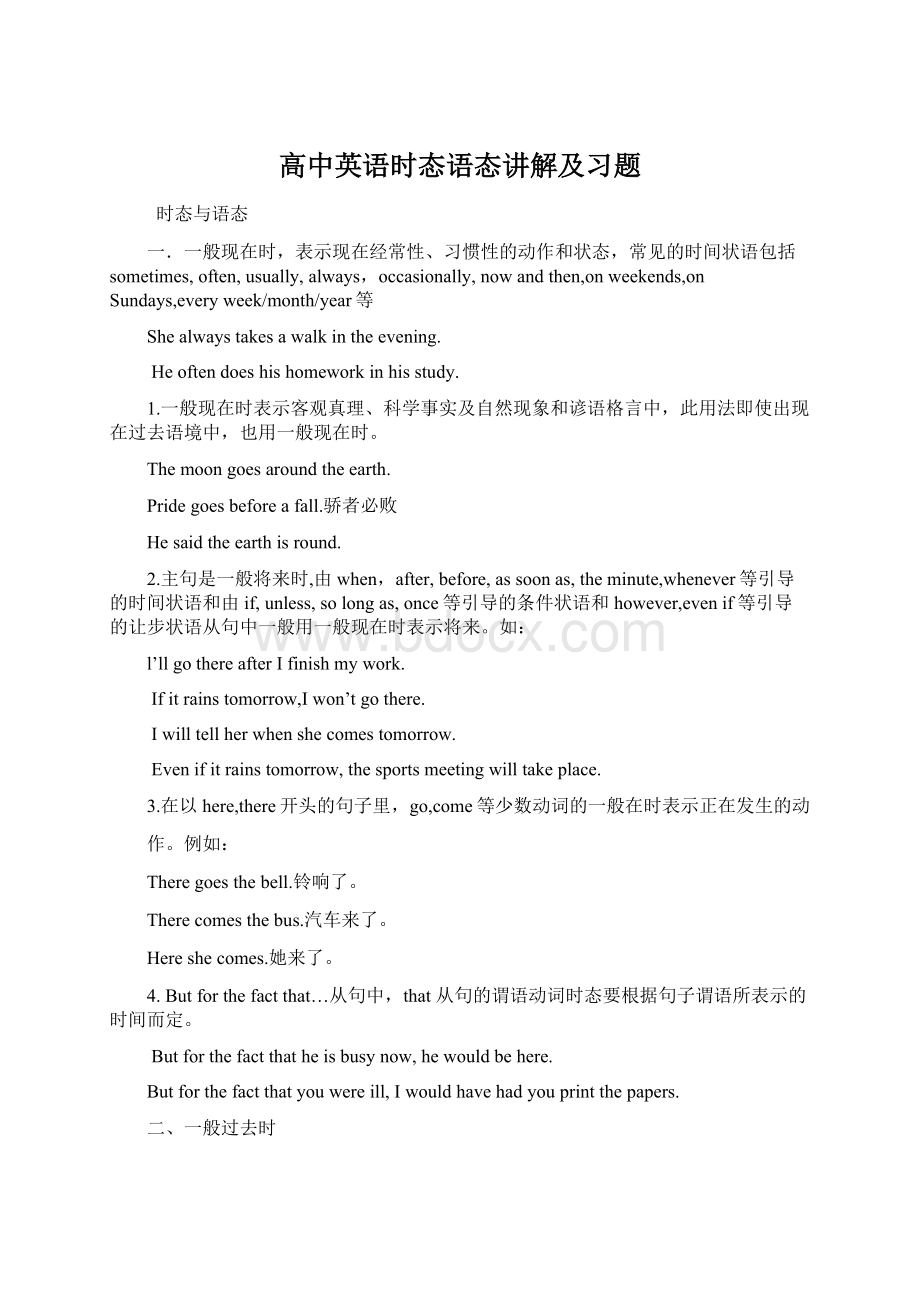高中英语时态语态讲解及习题.docx
《高中英语时态语态讲解及习题.docx》由会员分享,可在线阅读,更多相关《高中英语时态语态讲解及习题.docx(15页珍藏版)》请在冰豆网上搜索。

高中英语时态语态讲解及习题
时态与语态
一.一般现在时,表示现在经常性、习惯性的动作和状态,常见的时间状语包括sometimes,often,usually,always,occasionally,nowandthen,onweekends,onSundays,everyweek/month/year等
Shealwaystakesawalkintheevening.
Heoftendoeshishomeworkinhisstudy.
1.一般现在时表示客观真理、科学事实及自然现象和谚语格言中,此用法即使出现在过去语境中,也用一般现在时。
Themoongoesaroundtheearth.
Pridegoesbeforeafall.骄者必败
Hesaidtheearthisround.
2.主句是一般将来时,由when,after,before,assoonas,theminute,whenever等引导的时间状语和由if,unless,solongas,once等引导的条件状语和however,evenif等引导的让步状语从句中一般用一般现在时表示将来。
如:
l’llgothereafterIfinishmywork.
Ifitrainstomorrow,Iwon’tgothere.
Iwilltellherwhenshecomestomorrow.
Evenifitrainstomorrow,thesportsmeetingwilltakeplace.
3.在以here,there开头的句子里,go,come等少数动词的一般在时表示正在发生的动
作。
例如:
Theregoesthebell.铃响了。
Therecomesthebus.汽车来了。
Hereshecomes.她来了。
4.Butforthefactthat…从句中,that从句的谓语动词时态要根据句子谓语所表示的时间而定。
Butforthefactthatheisbusynow,hewouldbehere.
Butforthefactthatyouwereill,Iwouldhavehadyouprintthepapers.
二、一般过去时
表示过去的经常性、习惯性的动作或状态或者某个人过去的经历,与现在无关,常用的时间状语有yesterday,thedaybeforeyesterday,anhourago,theotherday,lastmonth/year,justnow,in1982,intheolddays,inthepast,whenIwasyoung,whenIwasinLondon,whenIwasachild等
Ireceivedtwoletterslastweek.
TheOlympicGameswereheldinBeijingin2008.
WhenIwasinBeijing,IoftenwenttoBeijinguniversity.
1.表示某人过去的经历
1)----Haveyougraduatedfromtheuniversity?
-----Yes,IlearnedEnglishfor4yearsintheuniversity.
2)----Haveyoufinishedyourhomework?
-----Yes,I________(finish)itwithinhaldanhour.
3)I______(be)inLondonfor10years,butIhaveneverregrettedreturningtoChina.
2.intend,wonder,think,realize等用过去时,表示说话人原来没有料到,打算,想到等
Ithoughtyouwereastudent.
Ididn’tthink/realizeyoufailedagain.
Ididn’tintendtohurtyou.
3.usedtodosth/woulddosth过去常常做某事
Weusedtospendourvacationinthemountains
4.句型
1).Itis(high)timesbdidsth/Itistimethatsbshoulddosth.某人该干某事了。
Itistimeyouwenttobed.
2).Wouldrathersbdidsth宁愿某人做某事,用于对现在和将来时间的虚拟。
Iwouldratheryoucametomorrow/now.
3).Would/should/oughtto/could/might/needn’t/wouldliketohavedonesth,but…句型
中,but后面的谓语动词需用一般过去时或过去进行时。
a.Heshouldhaveturnedupbuthehadanunexpectedvisitor.
b.---Didyouattendtheparty?
----Iwouldhave(attendedtheparty)butIwasbusy.
=Iwasbusyotherwise/orIwouldhaveattendedtheparty.
=IhadplannedtoattendthepartybutIwasbusy.
=Iwasgoingtoattendtheparty,butIwasbusy.
4).Wouldyoumindifsbdidsth?
如果…干某事,你介意吗?
WouldyoumindifIopenedthedoor?
三.一般将来时/过去将来时
一般将来时表示将来要发生的动作和存在的状况。
常见的时间状语有next…,tomorrow,
thedayaftertomorrow,in+时间段,before+时间点,inthefuture等.
1.will/shalldosth
1)表示事物的固有属性或者必然的趋势;
Fishwilldiewithoutwater.
2)will表示将来,有时含偶然性和临时性决定的意思。
----DoyouknowMr.Smithhascometoourtown?
----No,Iwillgoandvisithimrightnow.
2.begoingtodosth
1)表示事先考虑过,计划打算做某事,注意区分一下will表示临时性决定的用法。
HeisgoingtospeakonTvthisevening.
2)表示根据现在的迹象对未来进行推断。
Lookatthedarkclouds.Itisgoingtorain.
注意:
wasgoingto表示过去本打算做某事,但未做
----Tom,youdidn’tcometothepartylastnight?
----Iwasgoingto,butIsuddenlyrememberedIhadhomeworktodo.
3.bedoingsth有些动词如come,go,arrive,leave,begin,start,return等,其现在进行时表示按计划、安排近期将要发生的动作。
I’mleavingforBeijingnextmonth.
4.beabouttodosth/beonthepointofdoingsth(when)“即将干某事(这是突然)…”该结构不与具体的时间状语连用,但可以和并列连词when连用。
Thetrainisabouttostart.
Theplanisonthepointoftakingoff.
5.某些动词的一般现在时可以表示计划、安排将要做的事情,此种用法常常用于火车时刻、飞机时刻、电影开演、作息安排等时刻表上。
Wemusthurryup.Thefirstclassbeginsat8o’clock.
Thetrainleavesat5andarrivesat8.
6.betodosth
1).表示按计划或安排要做的事
Sheistogetmarriednextmonth.
注意:
were/wastohavedonesth表示未曾实现的计划。
Weweretohavetoldyou,butyouwerenotin.
2)表示“应该”,相当于should,oughtto.
Youaretoreportittothepolice.
3)表示“想,打算”,相当于intend,want.
Ifwearetobetherebeforeten,we’llhavetogonow.
四.现在进行时 am/is/aredoingsth
表示说话时正在发生的动作,有时也表示一段时间内持续进行的动作,常见的时间状语为:
now,atpresent,thesedays等
Iamwritinganovelthesedays.
I’mdoingawordpuzzleinthisnewspaper.
1)与always,constantly,continually,forever,allthetime等连用,带有厌恶、批评、不喜欢、赞扬等感情色彩。
Youarealwaysputtingyourthingsaround.
Heisalwayshelpingothers.
2)下列四类动词一般不用现在进行时
感觉类:
look,smell,feel,sound,taste,see,hear等
Thesouptastesgood.
情感类:
like,love,prefer,admire,hate,fear,adore等
Ilovemydadandmum.
心态类:
wish.Hope,want,need,believe,understand,agree,know,remember,forget等
Idon’tbelievemyeyes.
存在状态类:
appear,lie,remain,belong,have等
ThosebooksbelongtoMr.Li.
3)延续性动作用进行体,短暂性动作用一般体,一个延续性动作为背景,被一个短暂
性动作打断
Mybrotherfellwhilehewasridinghisbikeandhurthimself.
Asshewasreadingthenewspaper,Grannyfellasleep.
五.过去进行时was/weredoingsth
表示过去某一时间或某一段时间内正在进行的动作。
1.-----IsthereanythingWrongBob?
Youlooksad.
----Oh,nothingmuch.InfactIwasjustthinkingofmyfriendbackhome.
2.-----Sorrytohaveinterruptedyou.Pleasegoon.
-----WherewasI?
-----Youweresayingyoudidn’tlikeyourfather’sjob.
3.-----Hey,lookwhereyouaregoing?
-----Oh,I’mterriblysorry.Iwasn’tnoticing.
六.将来进行时willbedoingsth
表示将来某时正在进行的动作或者存在的状态。
1).DoctorWangwillbegivinganothertalkonthissubjectatthesametimenextweek.
2).ThistimetomorrowIwillbewatchingyouplayonTV.
3).Don’ttelephonemeafter8-------Iwillbehavingameeting.
七.现在完成时have/hasdonesth
表示过去某个动作已经完成,或者过去开始的动作一直延续到现在,强调对现在的影响,常见的时间状语有for,since+过去时间,sincethen,eversince,sofar,bynow/untilnow/uptonow,lately/recently,inthepast/last(tenyears),还有already,just,yet,neverever,still等常跟现在完成时连用。
Inthepastfewyears,greatchangeshavetakenplaceinmyhometown.
Hehaswritten8bookssofar.
Ihavealreadyseenthefilm.
Theyhaveworkedheresincetheyleftcollege.
Bynow/Untilnow/Uptonow,Ihasremembered3000Englishwords.
1).在“最高级+名词”的句子中用用现在完成时
Thisisthebesttea(that)Ihaveeverdrunk.
ThisisthebestfilmIhaveeverseen.
2).It/Thisisthefirst/second…time(that)sbhavedonesth某人第几次做某事
Thisisthefirsttime(that)Ihavecomehere.
3)It+hasbeen/is+一段时间+sincesbdidsth表示动作从终止已经多久了。
Ithasbeenfiveyearssincehelivedhere.他不在这工作已经5年了。
Ithasbeenfiveyearssincehebegantoworkhere.他在这工作已经五年了。
Ithasbeen3yearssincehesmoked.他不吸烟已经三年了。
4).have/hasgoneto到某地去了,还未回来
have/hasbeento曾经到过某地,人已回来
——WhereisLiHua?
-Hehasgonetothereading-room.
——SheknowsalotaboutShanghai.-Shehasbeenthere.
5).非延续性动词连用,即瞬间动词,join,lose,buy,borrow,leave,go,come,arrive,die,marry,finish,complete,begin,start,breakout等,在完成时态中,其肯定式不能和表示一段时间的状语连用。
如他参军已经三年了
可采用:
1)“ago法”:
Hejoinedthearmythreeyearsago.
2)“延续法”:
Hehasservedinthearmyforthreeyears.
Hehasbeenasoldierfor3years.
Hehasbeeninthearmyfor3years.
3)“since法”:
Itis/hasbeenthreeyearssincehejoinedthearmy.
翻译:
他和玛丽结婚已经三年了
延续性动词与非延续性动词之间的转换:
结婚marry---bemarried借borrow----keep;
买buy-----have离开leave---beaway
死亡die---bedead;结束finish/end/stop----beover
生病fallill---beill;起床getup-----beup;感冒catch/getacold----haveacold;来/去come/gohere----behere/there;
成为become----be;回来comeback-----beback;
睡着fallasleep-----beasleep;到达getto/arrive/reach---be(in);
认识gettoknow----know;出去go(get)out----beout;穿puton----wear;去国外goabroad---beabroad;
醒wakeup---beawake关闭turnoff-----beoff
打开turnon----beon动身leavefor----beofffor
睡觉gotosleep---beasleep打开/关闭open/closesth---keepsthopen/closed;
参加join-----bein+组织机构或beamemberof+组织机构;
上学gotoschool-----beinschool/beastudent;
交朋友makefriendswith------befriendswith
丢失lose-----belost/bemissing/begone;
失业loseone'sjob/work-----beoutofwork/ajob等
八.过去完成时haddonesth
表示“过去的过去”,必须找过去的时间作为参照点,常见的时间状语有before,by+过去时间,bytheendof+过去时间,bythetime+过去时间,bythen,untilthen等。
HehadlearnedsomeEnglishbeforeshecametotheinstitute.
Hesaidthathehadbeenabroadfor3years.
By1998,hehadstudiedFrenchfor2years.
Bytheendoflastyear,Ihadremembered5000words.
BythenhehadlearnedEnglishfor3years.
Untilthenhehadknownnothingaboutityet.
Bythetimehearrivedhome,hismotherhadcookedsupperforhim.
Bythetimehewas12yearsold,hehadbuiltalabforhimself.
1).表示愿望、打算的词如:
hope,expect,mean,intend,want,wish,suppose等,其过去完成时表示过去未曾实现的愿望或意图。
IhadhopedtoseemoreofShanghai.
Ihadmeanttohelpyou,butIwastoobusyatthatmoment.
2).Hardly/Scarcely/Barelyhadsbdonesthwhen….;Nosoonerhadsbdonesththan….一…就
HardlyhadIgoneoutwhenitbegantorain.
3)Itwasthefirsttime(that)sbhaddonesth这是某人第几次干某事
ItwasthefirsttimehehadbeentotheGreatWall.
九.现在完成进行时have/hasbeendoingsth(过去→现在→将来)
用来表示从过去某一时刻开始一直持续到现在(或今后还要继续一去)的动作。
例如:
Hehasbeendoingthemathsproblemssince8:
00.
Ithasbeenrainingfortwodays.
十.将来完成时willhavedonesth
By+现在时间have/hasdonesth
By+过去时间haddonesth
By+将来时间willhavedone
1).Bytheyearof2019,wewillhaveenteredtheuniversity.
2).Bythetimemyfathercomesback,Iwillhavefinishedthework.
比较:
Bythetimemyfathercameback,Ihadfinishedthework.
Bynow,Ihavefinished5000Englishwords.
十一.易混时态的区别
1.一般过去时与现在完成时的区别问题
这两个时态的动作都发生在过去,但现在完成时着重说明的是这个过去发生的动作同现在的关系、对现在产生的结果或影响等,所以,它不能和表示过去时间的状语连用;而一般过去时只着重说明这个动作是在过去某时发生的,并不表示这个过去的动作同现在的关系,更谈不上什么结果和